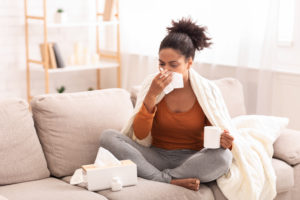Last updated on November 6th, 2023 at 10:00 am

As we enter the thick of cold and flu season, it is important to take precautions against getting sick. Germs that cause colds and flu thrive in colder weather, increasing the risk of sniffles and fevers. Thankfully, Dr. Ken Redcross, a board-certified internal medicine physician, has practical advice on staying healthy this winter.
First and foremost, regularly wash your hands. This basic yet effective preventative measure can play a crucial role in safeguarding health and reducing the spread of cold and flu viruses. “When you wash your hands and avoid touching your face, you can greatly lower the chance of getting sick,” says Dr. Redcross.
Cold and flu prevention also includes keeping up the healthy habits you already have in place. Getting a good night’s sleep keeps your body’s natural defenses at optimum efficiency. Drinking water also helps keep your body healthy as the mucus membranes that line the mouth, nose, and throat work more effectively as a protective barrier against germs when hydrated.
What you eat also makes a difference in your body’s defenses. “Try to incorporate more foods with vitamins C, D, and E into your diet,” recommends Dr. Redcross, as these are believed to support the immune system.
Another way to bolster your body’s defenses is to stay active. Research indicates that exercising regularly can stimulate the immune system and promote healthy sleep.
However, when you are already sick, it’s important to listen to your body and take it easy. Dr. Redcross advises that rest is best, and not to push yourself too hard if you are feeling under the weather.
Steps to Take If You’re Sick
Unfortunately, even if you follow all of Dr. Redcross’s advice, you could still get sick. When this happens, practice caution when taking conventional over-the-counter medications. It can be easy to take too much or mix medications that have the same ingredients.
For worry-free relief, Dr. Redcross recommends keeping homeopathic medicines like Oscillococcinum® and ColdCalm® handy.
Oscillococcinum reduces the duration and severity of flu-like symptoms when taken at the onset.* Oscillococcinum is supported by published clinical studies as well as more than 70 years of use throughout the world. Plus, unlike other flu medicines, it works without drowsiness or interacting with other medications. The small pellets melt under the tongue without water, making them ideal to take on the go.
For cold symptoms, there’s ColdCalm, which targets specific symptoms at every stage of the common cold. These non-drowsy, phenylephrine-free meltaway tablets are easy to take at the first sign to relieve sneezing, runny nose, nasal congestion, and minor sore throat.** ColdCalm is also available in pellets for kids or on-the-go travel, as well as baby liquid doses.
Over the course of cold and flu season, whether you beat the odds or find relief with homeopathic medicines, make sure to take care of yourself and get help if you need it. Dr. Redcross advises, “If you notice symptoms becoming worse after the first 2 days, especially if your fever goes away and then returns, be sure to talk to your doctor.”
Stay in the know this winter! Follow Boiron USA on Instagram, Facebook, Pinterest, and TikTok for more wellness tips and advice.
*These “Uses” have not been evaluated by the Food and Drug Administration.
**Claims based on traditional homeopathic practice, not accepted medical evidence. Not FDA evaluated






